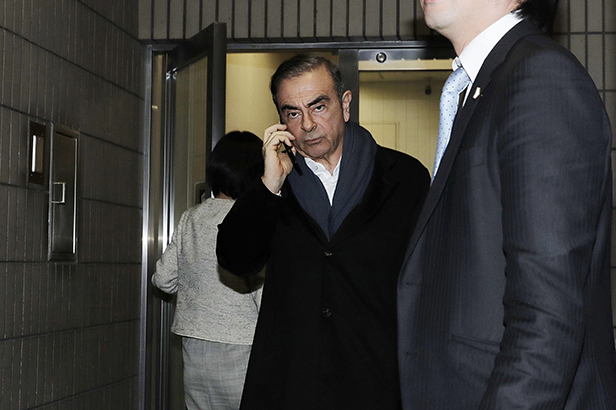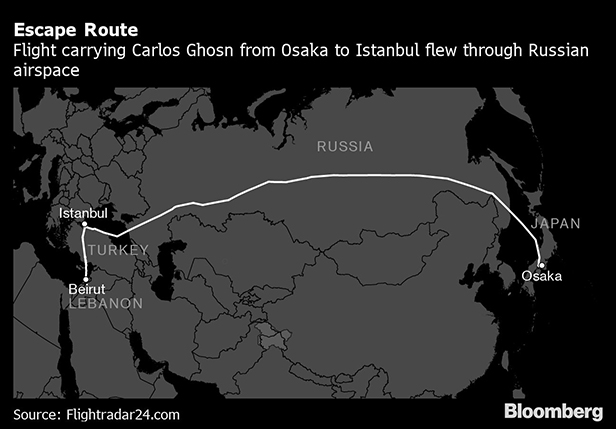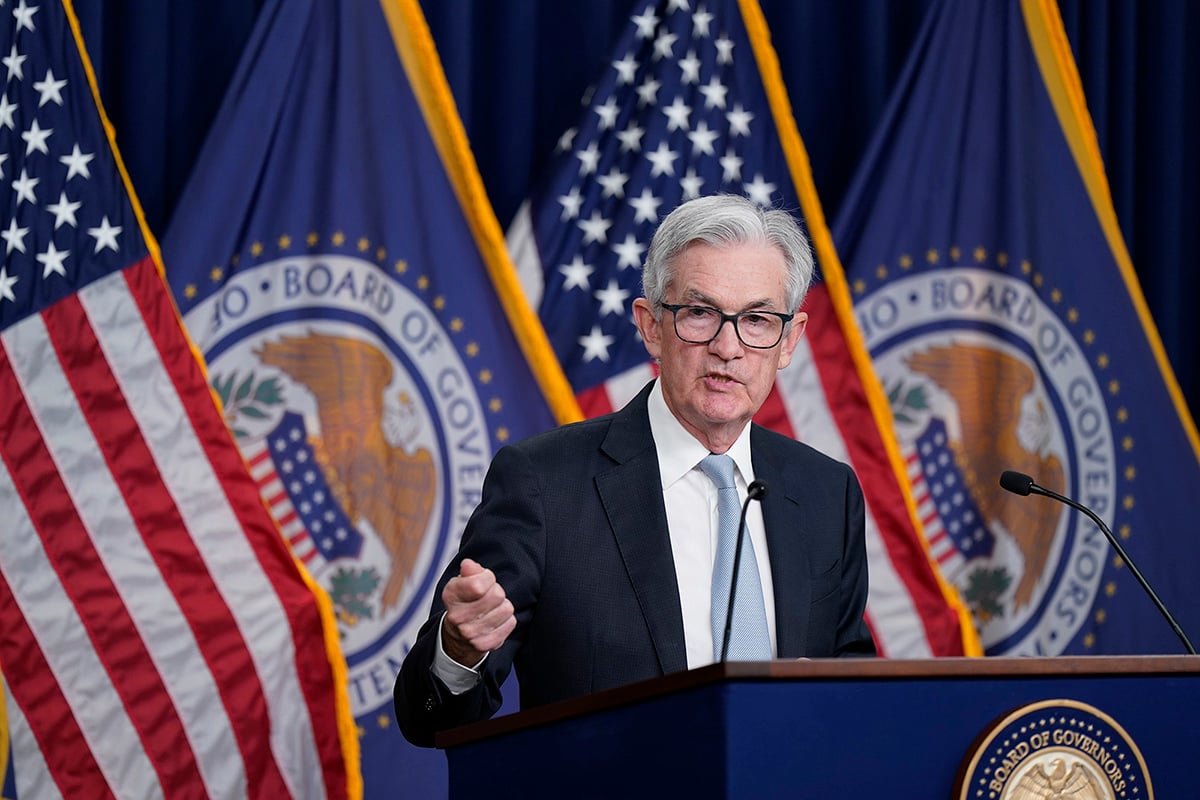 Carlos Ghosn, former chairman ofNissan Motor Co., leaves the office of his lawyer JunichiroHironaka in Tokyo, Japan, on Tuesday, March 12, 2019. Photographer: Keith Bedford/Bloomberg
Carlos Ghosn, former chairman ofNissan Motor Co., leaves the office of his lawyer JunichiroHironaka in Tokyo, Japan, on Tuesday, March 12, 2019. Photographer: Keith Bedford/Bloomberg
On Christmas Eve, CarlosGhosn walked into his lawyers' modest office in centralTokyo to speak to his wife, Carole, for only the second time sinceApril. During his long odyssey through the Japanese legalsystem—several arrests; more than 100 days in solitary confinement;seemingly endless interrogations; and, after his release on bail,intrusive 24-hour surveillance—Ghosn had been forced to accept manyhumiliations. But few demoralized the ousted leaderof Nissan Motor Co. and RenaultSA as much as having to seek court permission even to callhis spouse, who prosecutors viewed as a potential co-conspirator insome of the wide range of financial crimes with which he's beencharged.
|Carole, who'd departed Japan in a hurry after her husband wastaken into custody on a fourth charge in early April, has spentmuch of the last year lobbying tirelessly on his behalf—a campaignthat was taking an obvious toll.
|"They've destroyed our lives; we are scarred forever," she saidof Ghosn's accusers in a November interview with BloombergTelevision. "It's been the hardest year of my life."
|They were allowed to speak for one hour, but it wasn't enough;they still had much more to say to each other. As time ran out,according to one of Ghosn's lawyers, who described the call on hisblog, the fallen executive signed off with a simple "I love you,habibi," an Arabic term of affection.
|It seemed impossible to know when the couple would next have achance to speak, let alone embrace. The following day, the65-year-old Ghosn learned that the second of his two trials mightbegin in 2021, raising the prospect of another year or more incourt-imposed isolation. Even his children were being targeted byinvestigators. Japanese prosecutors had questioned Ghosn's sonAnthony, who was involved in some of the transactions they weretargeting, as well as one of his daughters, according to a personfamiliar with the matter. Fearing arrest, Anthony had been unableto visit his father.
|
See also:
|
Ghosn's prospects of proving his innocence in Japan were dismal.Prosecutors there win more than 99 percent of thecases they try and enjoy a wide range of procedural advantages.Against Ghosn, who was facing potential sentences of more than adecade in prison, they had an even greater-than-usual asset: thefull co-operation of Nissan, which had repeatedly made clear itsdetermination to see him convicted and had provided a huge trove ofdocuments as well as hands-on investigative assistance. Ghosn, acitizen of Brazil, France, and Lebanon, had sought diplomatic helpfrom all three countries. Only the last had acted with evidententhusiasm, but its efforts weren't getting anywhere.
|Ghosn, however, had another option—a desperate play, months inthe planning, that might restore some portion of his freedom ifeverything went right, or send him straight back to a7-square-meter (75-square-foot) cell in Tokyo's central jail if anyaspect went awry. In the Middle East, a former U.S. Army GreenBeret and a veteran of the 2003 invasion of Iraq were preparing adaring plan to spirit Ghosn out of Tokyo, under the noses ofJapanese police. They aimed to bring him back to Beirut—the citywhere he had spent most of his childhood and the capital of acountry where, thanks to his business success, Ghosn is consideredsomething of a national hero.
|On its face, it must have seemed like a ridiculous idea. Whilethe terms of Ghosn's bail did not include a requirement to wear anankle bracelet or other electronic tracker, his movements wereclosely monitored. Prosecutors had trained a camera on the door ofhis rented house, in Tokyo's busy Roppongi neighborhood, and as hemoved through the Japanese capital he was shadowed by teams ofplainclothes agents.
|Ghosn, who has bushy eyebrows, elongated ears, and prominentsideburns, would have a memorable face even as a regular citizen.Two decades of corporate celebrity meant that he was perhaps themost recognizable foreigner in Japan. His chances of slippingundetected through Tokyo and onto an airplane would have seemedslim, to put it mildly.
|Yet there was a clear window of opportunity. New Year's istypically the longest holiday of the year in Japan, a time whengovernment offices can close for more than a week and even the mosthard-boiled prosecutors and police detectives take time off to bewith their families. Moreover, Ghosn had good reason to believe hecould evade at least some of the men monitoring his movements: Hislawyers had recently threatened to file a complaint against aprivate security company hired by Nissan to follow him, claiming itwas infringing illegally on his rights. According to a personfamiliar with the situation, the company's agents had backed off asa result—at least temporarily. (Nissan declined to comment.) IfGhosn was going to escape, this was the moment to do it. But heneeded the right help.
|The Escape
In the shadowy world of private-securitycontractors, Michael Taylor was a swashbuckler who stood out. Heprotected powerful people and companies, secretly helped the U.S.government investigate crimes, and admitted breaking thelaw himself. A veteran of the U.S. Army's elite Special Forces—thefamed Green Berets—Taylor in 1994 founded AmericanInternational Security Corp., a Boston-area contractor thatprovided security for oil drilling operations and corporateexecutives, and rescued abducted children, among other assignments.He was hired by The New York Times to mount a rescue of DavidRohde, a correspondent who'd been kidnapped in 2008 in Afghanistan.(Rohde ultimately escaped on his own.) He also worked as anundercover asset for the Federal Bureau of Investigation (FBI), theDrug Enforcement Agency (DEA), and other federal bodies.
|Taylor's career seemed to be prospering in 2007 when his firmsecured a Pentagon contract, which eventually paid out $54 million,to train Afghan special-forces troops. But in 2012, his fortunestook a dramatic turn for the worse. He was charged in Utah with anFBI agent over a plot to obstruct a fraud investigation intowhether the Afghan contract was awarded improperly. Taylorultimately pleaded guilty to two fraud charges and was sentenced totwo years in prison. It wasn't his first guilty plea. In 1997,he admitted two misdemeanor charges in Massachusettsrelated to a police report filed in a domestic case in which he'dbeen hired, his lawyers said.
|Much of Taylor's work over the years had, improbably enough,involved Lebanon. Taylor was born on Staten Island and graduatedhigh school in Massachusetts, but over the years he developed deepties to Ghosn's home country. He was deployed to Beirut during theLebanese civil war, beginning what his lawyers said was "a lifelongrelationship with the Christian community in Lebanon"—the samecommunity of which Ghosn is a prominent member. Fit, square-jawed,and with silver hair, Taylor speaks Arabic, his wife Lamia isLebanese, and two of their three sons attended college inLebanon.
|For the Ghosn operation, Taylor had a partner, a Lebanese-bornman named George-Antoine Zayek. Originally trained as a gemologist,his brother said by telephone, Zayek was also a member of aChristian militia when he met Taylor in the early 1980s, a timewhen Lebanon had fractured violently along sectarian lines. Zayekappears to have been associated with Taylor and his companies sincethe 1990s, based on public records in the United States. Accordingto his brother, however, Zayek left Lebanon at the start of theinvasion of Iraq in 2003, when he began working for a privatesecurity company there. Taylor couldn't be reached for comment, andZayek didn't respond to multiple voicemail messages seekingcomment.
|On the morning of Sunday, December 29, Taylor and Zayek arrivedin a Bombardier Global Express Jet—a plane with a range of morethan 11,000 kilometers (6,800 miles)—at the private-jet terminal ofKansai International Airport, a busy hub built on an artificialisland near Osaka. There were also two large black cases on board,according to people familiar with the flight who asked not to beidentified.
|Later the same day, according to security-camera footagereported on by Japanese media, Ghosn walked out the front door ofhis house, wearing a hat and a surgical-style face mask commonlyused in Japan to protect against germs. He then took a bullet trainfrom Tokyo's Shinagawa station to Osaka at about 4:30 p.m. localtime and, after the journey, took a cab to a hotel near theairport, the network NTV reported.
|That evening, the same Bombardier jet took offfrom Kansai bound for Istanbul. According to a person familiar withthe investigation of the flight, the team believed that flyingstraight to Beirut, a city that receives few if any arrivals fromOsaka, would raise too many suspicions.
|
Outbound passengers at the private terminal aren't exempt frompassport control, and according to people familiar with airportoperations, there were customs and immigration officials presentbefore the Bombardier's departure. But Ghosn wasn't boarding as anofficial passenger. He was, apparently, cargo, concealed in a largeblack case that, according to the people, was too big to fit intothe airport's X-ray machines. With nothing obviouslyamiss, by 11:10 p.m., the jet was in the air.
|Reaching Istanbul's Ataturk Airport would take just over 12hours. The team ferrying Ghosn appeared to have chosen its routecarefully. From Osaka the plane headed north-northwest, avoidingSouth Korea—which has an extradition treaty with Japan—and thencrossing into Russian airspace, where it remained for almost itsentire journey. That wasn't the most direct route, which would havetaken the jet over China, Mongolia, and Kazakhstan. But it did keepGhosn over a country where he has considerable connections, thanksto his work rescuing AvtoVAZ, a troubled Soviet-eraautomaker that's now part of the Renault-Nissan alliance. If theJapanese government demanded his plane be stopped, he might havehoped for sympathy, or at least stalling, from Moscow.
|In fact, the Japanese authorities seemed to have no idea Ghosnwas no longer in the country, and the Bombardier landed in Istanbulat around 5:30 a.m. local time on Dec. 30. Changing planes atAtaturk could expose Ghosn once again to detection. Just as atKansai, according to a Turkish official who asked not to beidentified discussing the details of the government's subsequentinvestigation, Ghosn made the short trip inside a box. The secondjet, a shorter-range Bombardier, took off shortly after for thebrief flight to Beirut.
|Safely on the ground in the country of his youth, Ghosn didn'thave to hide his identity. Although his lawyers had taken histravel documents as a condition of his bail, Ghosn had two Frenchpassports—a rare privilege, granted to citizens whose employmentmight require them to travel while also handing over a passport forvisa applications. Ghosn had been able to keep the second one,under the condition that it remain in a plastic case secured by acombination lock for which only his lawyers had the code. Accordingto a person familiar with it, the case wasn't particularly sturdy,and with a hammer or drill and a bit of time it wouldn't bedifficult to crack open.
|His French passport in hand, Ghosn crossed into Lebanon legally.Carole, who had been counting the days since the couple had lastbeen together (just short of nine months), was in Beirut to see herfamily for Christmas when Ghosn landed. She rushed to meet him andkept him largely to herself until the couple met up with a fewfriends for a New Year's Eve dinner. A photo showed them at a tablesharing wine and Champagne. They looked, if only for a moment, likea normal couple with normal concerns.
|Legal Repercussions for Aiders andAbetters
Even Ghosn's closest advisers wereblindsided when news of his escape began to break on December 31.His Japanese lawyers said they had no idea what he had planned; inan impromptu press conference outside his office, leadcounsel Junichiro Hironaka seemed genuinelybewildered by what had just occurred, describing himself as"dumbfounded." Ghosn's U.S. representatives at New York law firmPaul Weiss, had been kept similarly in the dark. So was Greg Kelly,the former Nissan executive who'd been taken into custody at thesame time and remains in Tokyo, forbidden to leave the countrybefore trial. (He denies wrongdoing.)
|With no details forthcoming on how Ghosnmanaged to sneak out of Japan, media outlets around the world beganspeculating on a range of outlandish theories. The most widelycirculated was that he had left his house disguised as a very largemusical instrument after hosting a troupe of Lebanese musicians fora holiday concert.
|Ghosn's public-relations apparatus, which includes top-drawerfirms in New York and Paris, let most of the speculation gouncommented upon. That changed dramatically as reports began toappear suggesting that Carole Ghosn or other members of his familyhad helped plan his escape—which, if accurate, might expose them tocriminal charges in Japan or elsewhere. On January 2, Ghosn said ina statement that, somewhat improbably given the constantsurveillance of his communications, "I alone arranged for mydeparture." His family, he said, "had no role whatsoever."
|Even if that's true, Ghosn had plenty of help from individualswho may now be at risk of serious legal repercussions. In Turkey,the authorities quickly detained seven people connected with theflights, including four pilots, and remanded most of them intocustody. MNG Jet Havacilik AS, the company fromwhich the aircraft were leased, also filed a criminal complaint andsaid an employee falsified records in order to hide the fact thatthey were ferrying a fugitive.
|Japan's justice minister, meanwhile, announced the opening of aninvestigation into Ghosn's escape, raising the prospect of chargesfor anyone who aided him. Nor is Ghosn entirely in the clear. WhileLebanon is a nation that refuses, as a matter of policy, toextradite its citizens for trial abroad, he's probably stuck thereindefinitely. Japan has requested that Interpol issue a so-calledRed Notice in Ghosn's name, making it known to other lawenforcement authorities that the country considers him a fugitive.His life as a globe-trotting member of the corporate elite is, atleast for the foreseeable future, over.
|A long-term life on the run isn't easy, but it's notimpossible. Roman Polanski, the "Rosemary's Baby" directorwho fled the U.S. in 1978 to avoid being imprisoned in an underagesex case, has lived openly in Europe ever since—protected byFrance's similar policy against extraditing citizens—and he remainsa celebrated, if controversial, filmmaker.
|But such an existence wouldn't deliver what Ghosn seems to cravemost: legal vindication. His lawyers intend to propose that he betried on the Japanese allegations in Lebanon, with Tokyoprosecutors providing investigative files to allow their Beirutcounterparts to bring the case, according to Ghosn's Beirutattorney, Carlos Abou Jaoude. Such an arrangement would be all butunprecedented. And for the Japanese government, it would be deeplyembarrassing: Agreeing to it would amount to an admission that itwon't be able to get him back. Japanese prosecutors, meanwhile,would be certain to view a Lebanese trial as biased in favor of thedefendant. Ghosn is one of Lebanon's most celebrated citizens—hisface is even on a postage stamp—and it's hard to imagine afriendlier locale for a hearing.
|Ghosn was awaiting trial in Japan on four charges—two forallegedly understating his compensation in regulatory filings, andtwo more "breach of trust" allegations, in which prosecutors claimhe used Nissan's resources for his own gain. From the beginning ofhis legal drama, he's denied wrongdoing and claimed that theallegations against him are the result of a political vendetta—anillegitimate attempt to settle scores and stop him from integratingNissan more closely with Renault—that should never have put him ina courtroom, let alone a jail cell. According to people familiarwith his intentions, he plans to use his freedom to assail theJapanese legal system and to do everything he can to publiclydiscredit the charges. His first salvo will come at a pressconference he plans to hold in Beirut on Wednesday.
|Throughout his career, Ghosn portrayed himself as a singularfigure, the driving force behind the creation of one of the world'slargest automotive groups and the only person capable of keeping ittogether.
|In recent years, he was clearly in legacy mode, preparing thegroundwork for a deal that would finally bring Nissan and Renaulttogether under a single corporate umbrella. Had his plans toincorporate rival Fiat-Chrysler into the alliancecome to fruition, he might have created the world's largestcarmaker and reasonably expected to be remembered as a businessvisionary, one of the few individuals—like LeeIacocca, Jack Welch, or Gordon Moore—whosecareers helped reshape their industries.
|For the foreseeable future, however, he will be known above allas something very different: a fugitive.
|— With assistance from Dana Khraiche,Zeke Faux, Greg Farrell, David Kocieniewski, David Voreacos,Tsuyoshi Inajima, Neil Weinberg, and Jeremy Diamond.
|Copyright 2020 Bloomberg. All rightsreserved. This material may not be published, broadcast, rewritten,or redistributed.
Complete your profile to continue reading and get FREE access to Treasury & Risk, part of your ALM digital membership.
Your access to unlimited Treasury & Risk content isn’t changing.
Once you are an ALM digital member, you’ll receive:
- Critical Treasury & Risk information including in-depth analysis of treasury and finance best practices, case studies with corporate innovators, informative newsletters, educational webcasts and videos, and resources from industry leaders.
- Exclusive discounts on ALM and Treasury & Risk events.
- Access to other award-winning ALM websites including PropertyCasualty360.com and Law.com.
*May exclude premium content
Already have an account? Sign In
© 2024 ALM Global, LLC, All Rights Reserved. Request academic re-use from www.copyright.com. All other uses, submit a request to [email protected]. For more information visit Asset & Logo Licensing.






